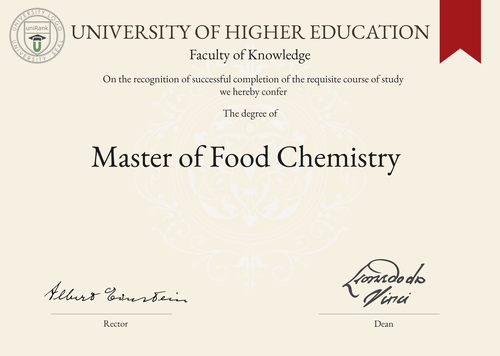
Master of Food Chemistry (MFC)
Guide to Master of Food Chemistry Program/Course/Degree
Master of Food Chemistry (MFC)

Program Name
Master of Food ChemistryProgram or Degree abbreviation
MFCDuration range
The duration of the Master of Food Chemistry program can vary depending on the country or university, typically ranging from 1 to 2 years.Tuition range
The tuition fees for the Master of Food Chemistry program can vary depending on the country or university, with a range of fees available.Overview
The Master of Food Chemistry program is designed to provide students with a comprehensive understanding of the chemical and biochemical processes involved in food production, processing and analysis. Students will gain knowledge in areas such as food composition, food safety, food additives and food quality control.Curriculum Overview by year
The curriculum of the Master of Food Chemistry program is structured to cover a wide range of topics related to food chemistry. The specific courses offered may vary by university, but typically include: Year 1: - Food Chemistry Fundamentals - Food Analysis Techniques - Food Microbiology - Food Processing and Preservation - Food Safety and Quality Assurance Year 2: - Advanced Food Chemistry - Food Additives and Ingredients - Food Packaging and Shelf Life - Food Toxicology - Research Project or InternshipKey Components
The key components of the Master of Food Chemistry program include gaining a deep understanding of the chemical and biochemical processes involved in food production, developing skills in food analysis techniques and learning about food safety and quality control measures.Career Prospects
Graduates of the Master of Food Chemistry program can pursue various career opportunities in the food industry, research institutions, government agencies and consulting firms. Possible job roles include food chemist, quality control analyst, research scientist, food safety specialist and product development manager.Salary Expectations
The salary expectations for graduates of the Master of Food Chemistry program can vary depending on factors such as the country, industry and level of experience. Generally, professionals in this field can expect competitive salaries that reflect their expertise and responsibilities. For a more accurate understanding of salary expectations, you can utilize the Job Sites Search Engine, from our sister site jobRank, which searches over 4,600 job sites worldwide. Make sure to specify not only the job title but also the country you are interested in.Conclusions:
It is important to note that the duration, tuition fees, curriculum, key components, career prospects and salary expectations of the Master of Food Chemistry program can vary depending on the chosen country or location of study, as well as the chosen university. Prospective students are advised to research and compare different programs and institutions to find the best fit for their academic and career goals. Visitors interested in pursuing a Master of Food Chemistry degree can use the uniRank World Universities Search Engine to search for universities offering this specific degree anywhere in the world. This search engine provides a comprehensive database of universities and their programs, allowing individuals to find the most suitable options for their educational journey.World Universities Search Engine
search for Master of Food Chemistry (MFC) and add the Location (country, state etc.) or specific University you are interested in studying at.
Query examples:
- Master of Food Chemistry (MFC) United States
- Master of Food Chemistry (MFC) United Kingdom online
- Master of Food Chemistry (MFC) Australia international students
- Master of Food Chemistry (MFC) University of California
- Master of Food Chemistry (MFC) University of London tuition fees
- Master of Food Chemistry (MFC) University of Sydney scholarships
Share Program/Course
Interesting? Share this program/course/degree info with your friends now.